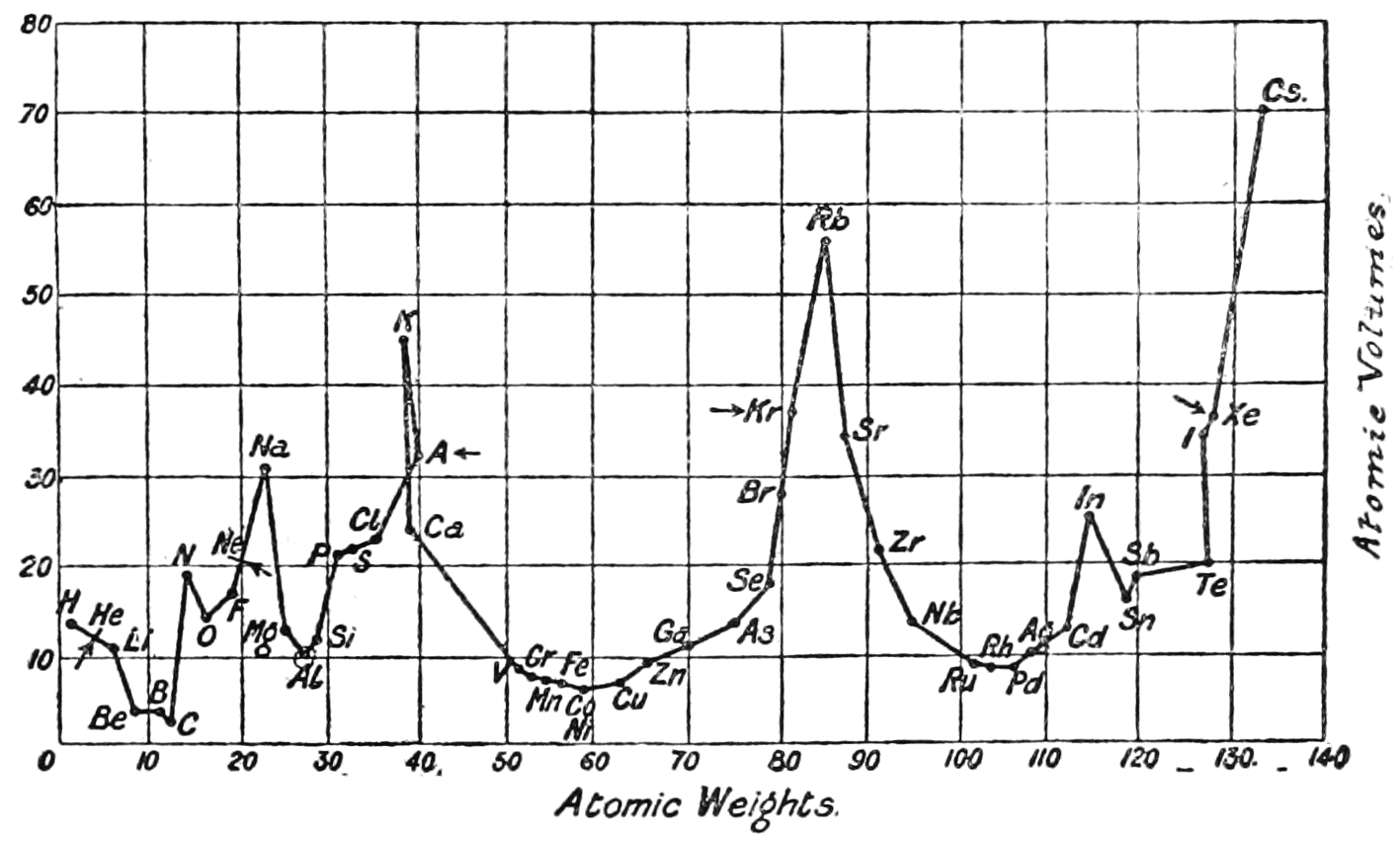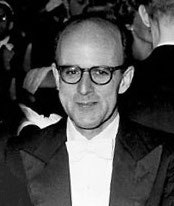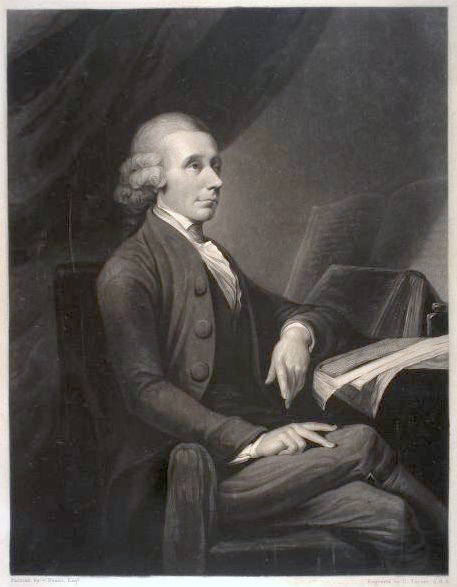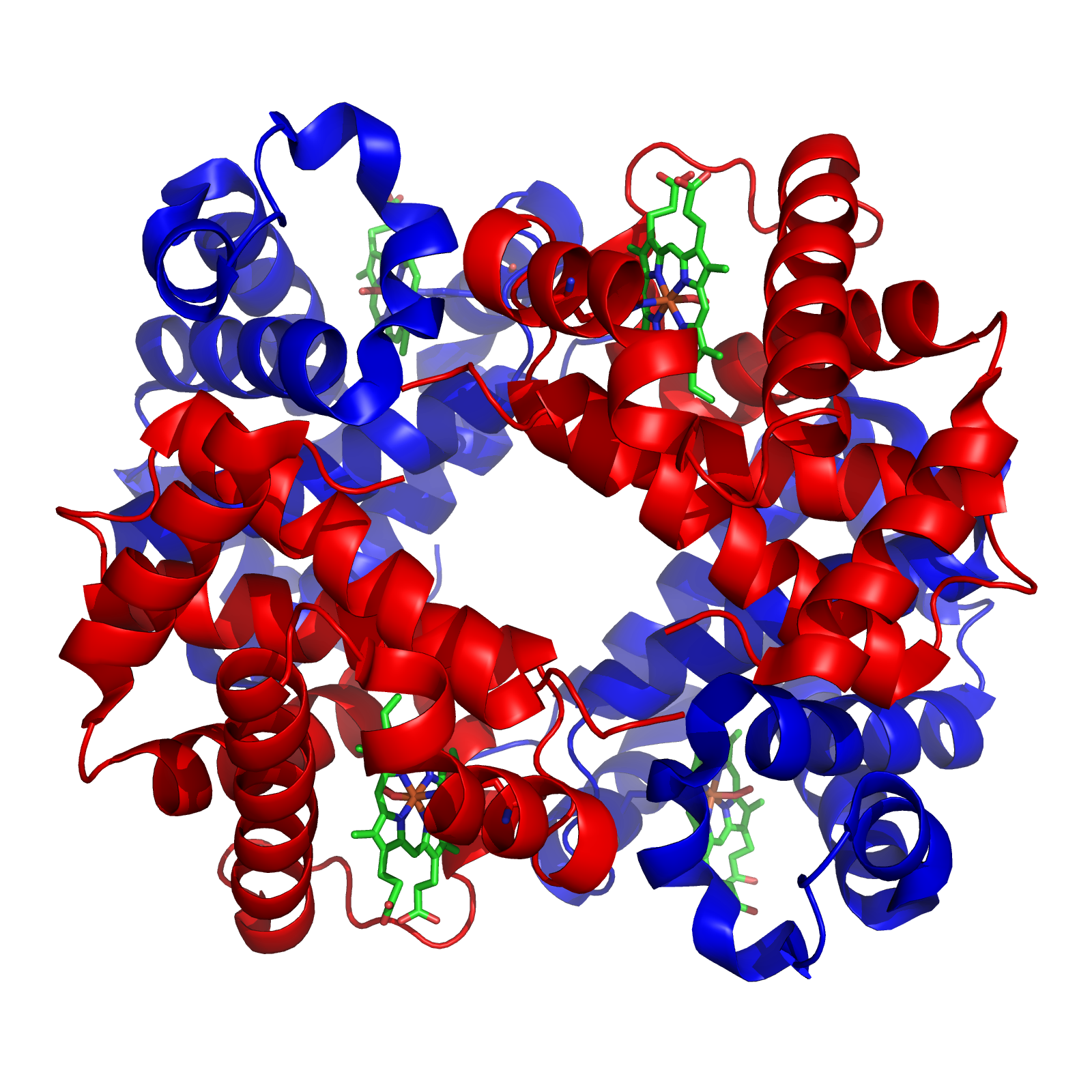|
Julius Lothar Meyer
Julius Lothar Meyer (19 August 1830 – 11 April 1895) was a German chemist. He was one of the pioneers in developing the earliest versions of the periodic table of the chemical elements. The Russian chemist Dmitri Mendeleev (his chief rival) and he both had worked with Robert Bunsen. Meyer never used his first given name and was simply known as Lothar Meyer throughout his life. Career Meyer was born in Varel, Germany (then part of the Duchy of Oldenburg). He was the son of Friedrich August Meyer, a physician, and Anna Biermann. After attending the Altes Gymnasium in Oldenburg, he studied medicine at the University of Zurich in 1851. Two years later, he studied pathology at the University of Würzburg as a student of Rudolf Virchow. At Zurich, he had studied under Carl Ludwig, which had prompted him to devote his attention to physiological chemistry. After graduating as a Doctor of Medicine from Würzburg in 1854, he went to Heidelberg University, where Robert Bunsen held the ch ... [...More Info...] [...Related Items...] OR: [Wikipedia] [Google] [Baidu] |
Varel
Varel () is a town in the district of Friesland, in Lower Saxony, Germany. It is situated near the Jade River and the Jade Bight, approximately south of Wilhelmshaven and north of Oldenburg. With a population of 23,984 (2020) it is the biggest town in the district of Friesland. Geography Varel is located south of the Jade Bight at the North Sea on the Geest. Over time, the city expanded into lower areas as the construction of dykes helped to secure these areas from floods. The environment of Varel is shaped by agriculture, forests and the sea. Neighbour municipalities Jade in the district of Wesermarsch is the Eastern neighbour municipality of Varel. In the South of Varel one will find the municipalities Rastede Rastede (Low German: ''Raastäe/Raas'') is a municipality in the Ammerland district, in Lower Saxony, Germany. It is situated approximately 12 km north of Oldenburg. It is the site of the Schloss Rastede. The Rastede railway station is ... and ... [...More Info...] [...Related Items...] OR: [Wikipedia] [Google] [Baidu] |
Rudolf Virchow
Rudolf Ludwig Carl Virchow ( ; ; 13 October 18215 September 1902) was a German physician, anthropologist, pathologist, prehistorian, biologist, writer, editor, and politician. He is known as "the father of modern pathology" and as the founder of social medicine, and to his colleagues, the "Pope of medicine". Virchow studied medicine at the Friedrich Wilhelm University under Johannes Peter Müller. While working at the Charité hospital, his investigation of the 1847–1848 typhus epidemic in Upper Silesia laid the foundation for public health in Germany, and paved his political and social careers. From it, he coined a well known aphorism: "Medicine is a social science, and politics is nothing else but medicine on a large scale". His participation in the Revolution of 1848 led to his expulsion from Charité the next year. He then published a newspaper ''Die Medizinische Reform'' (''The Medical Reform''). He took the first Chair of Pathological Anatomy at the University of Wü ... [...More Info...] [...Related Items...] OR: [Wikipedia] [Google] [Baidu] |
Privatdozent
''Privatdozent'' (for men) or ''Privatdozentin'' (for women), abbreviated PD, P.D. or Priv.-Doz., is an academic title conferred at some European universities, especially in German-speaking countries, to someone who holds certain formal qualifications that denote an ability (''facultas docendi'') and permission to teach ('' venia legendi'') a designated subject at the highest level. To be granted the title Priv.-Doz. by a university, a recipient has to fulfill the criteria set by the university which usually require excellence in research, teaching, and further education. In its current usage, the title indicates that the holder has completed their habilitation and is therefore granted permission to teach and examine students independently without having a full professorship (chair). With respect to the level of academic achievement, the title of ''Privatdozent'' is comparable to that of an Associate Professor (United States), Senior Lecturer (United Kingdom), or ''maître de con ... [...More Info...] [...Related Items...] OR: [Wikipedia] [Google] [Baidu] |
Habilitation
Habilitation is the highest university degree, or the procedure by which it is achieved, in Germany, France, Italy, Poland and some other European and non-English-speaking countries. The candidate fulfills a university's set criteria of excellence in research, teaching, and further education, which usually includes a dissertation. The degree, sometimes abbreviated ''Dr. habil''. (), ''dr hab.'' (), or ''D.Sc.'' ('' Doctor of Sciences'' in Russia and some CIS countries), is often a qualification for full professorship in those countries. In German-speaking countries it allows the degree holder to bear the title ''PD'' (for ). In a number of countries there exists an academic post of docent, appointment to which often requires such a qualification. The degree conferral is usually accompanied by a public oral defence event (a lecture or a colloquium) with one or more opponents. Habilitation is usually awarded 5–15 years after a PhD degree or its equivalent. Achieving this ... [...More Info...] [...Related Items...] OR: [Wikipedia] [Google] [Baidu] |
Franz Ernst Neumann
Franz Ernst Neumann (11 September 1798 – 23 May 1895) was a German mineralogist and physicist. He devised the first formulas to calculate inductance. He also formulated Neumann's law for molecular heat. In electromagnetism, he is credited for introducing the magnetic vector potential. Biography Early life Franz Ernst Neumann was born in Joachimsthal, Margraviate of Brandenburg (near Berlin), the son of Ernst Neumann, a farmer who became a state agent. His mother was a Countess who was not allowed to marry Ernst, and Neumann did not meet her mother until he was 10 years old. Neumann attended a Gymnasium in Berlin, where he excelled in mathematics. However his studies were interrupted by the war with France. In 1815 he paused his education at Berlin to serve as a volunteer in the Hundred Days against Napoleon, and was wounded in the Battle of Ligny. He later returned to finish his studies in Berlin. Subsequently, he enrolled at Berlin University in 1818 as a student of th ... [...More Info...] [...Related Items...] OR: [Wikipedia] [Google] [Baidu] |
Königsberg
Königsberg (; ; ; ; ; ; , ) is the historic Germany, German and Prussian name of the city now called Kaliningrad, Russia. The city was founded in 1255 on the site of the small Old Prussians, Old Prussian settlement ''Twangste'' by the Teutonic Knights during the Northern Crusades, Baltic Crusades. It was named in honour of King Ottokar II of Bohemia, who led a campaign against the pagan Old Prussians, a Baltic tribe. A Baltic Sea, Baltic port city, it successively became the capital of the State of the Teutonic Order, the Duchy of Prussia and the provinces of East Prussia and Province of Prussia, Prussia. Königsberg remained the coronation city of the Prussian monarchy from 1701 onwards, though the capital was Berlin. From the thirteenth to the twentieth centuries on, the inhabitants spoke predominantly German language, German, although the city also had a profound influence upon the Lithuanian and Polish cultures. It was a publishing center of Lutheranism, Lutheran literatu ... [...More Info...] [...Related Items...] OR: [Wikipedia] [Google] [Baidu] |
Gustav Kirchhoff
Gustav Robert Kirchhoff (; 12 March 1824 – 17 October 1887) was a German chemist, mathematician, physicist, and spectroscopist who contributed to the fundamental understanding of electrical circuits, spectroscopy and the emission of black-body radiation by heated objects. He also coined the term ''black body'' in 1860. Several different sets of concepts are named "Kirchhoff's laws" after him, which include Kirchhoff's circuit laws, Kirchhoff's law of thermal radiation, and Kirchhoff's law of thermochemistry. The Bunsen–Kirchhoff Award for spectroscopy is named after Kirchhoff and his colleague, Robert Bunsen. Life and work Gustav Kirchhoff was born on 12 March 1824 in Königsberg, Prussia, the son of Friedrich Kirchhoff, a lawyer, and Johanna Henriette Wittke. His family were Lutheranism, Lutherans in the Evangelical Church of Prussia. He graduated from the Albertus University of Königsberg in 1847 where he attended the mathematico-physical seminar directed by Carl Gusta ... [...More Info...] [...Related Items...] OR: [Wikipedia] [Google] [Baidu] |
Hemoglobin
Hemoglobin (haemoglobin, Hb or Hgb) is a protein containing iron that facilitates the transportation of oxygen in red blood cells. Almost all vertebrates contain hemoglobin, with the sole exception of the fish family Channichthyidae. Hemoglobin in the blood carries oxygen from the respiratory organs (lungs or gills) to the other tissues of the body, where it releases the oxygen to enable aerobic respiration which powers an animal's metabolism. A healthy human has 12to 20grams of hemoglobin in every 100mL of blood. Hemoglobin is a metalloprotein, a chromoprotein, and a globulin. In mammals, hemoglobin makes up about 96% of a red blood cell's dry matter, dry weight (excluding water), and around 35% of the total weight (including water). Hemoglobin has an oxygen-binding capacity of 1.34mL of O2 per gram, which increases the total blood oxygen capacity seventy-fold compared to dissolved oxygen in blood plasma alone. The mammalian hemoglobin molecule can bind and transport up to four ... [...More Info...] [...Related Items...] OR: [Wikipedia] [Google] [Baidu] |
Oxygen
Oxygen is a chemical element; it has chemical symbol, symbol O and atomic number 8. It is a member of the chalcogen group (periodic table), group in the periodic table, a highly reactivity (chemistry), reactive nonmetal (chemistry), nonmetal, and a potent oxidizing agent that readily forms oxides with most elements as well as with other chemical compound, compounds. Oxygen is abundance of elements in Earth's crust, the most abundant element in Earth's crust, making up almost half of the Earth's crust in the form of various oxides such as water, carbon dioxide, iron oxides and silicates.Atkins, P.; Jones, L.; Laverman, L. (2016).''Chemical Principles'', 7th edition. Freeman. It is abundance of chemical elements, the third-most abundant element in the universe after hydrogen and helium. At standard temperature and pressure, two oxygen atoms will chemical bond, bind covalent bond, covalently to form dioxygen, a colorless and odorless diatomic gas with the chemical formula ... [...More Info...] [...Related Items...] OR: [Wikipedia] [Google] [Baidu] |
Respiration (physiology)
In physiology, respiration is the transport of oxygen from the outside environment to the Cell (biology), cells within Tissue (biology), tissues, and the removal of carbon dioxide in the opposite direction to the environment by a respiratory system. The physiological definition of respiration differs from the Cellular respiration, biochemical definition, which refers to a metabolic process by which an organism obtains energy (in the form of ATP and NADPH) by oxidizing nutrients and releasing waste products. Although physiologic respiration is necessary to sustain cellular respiration and thus life in animals, the processes are distinct: cellular respiration takes place in individual cells of the organism, while physiologic respiration concerns the Diffusion#Diffusion vs. bulk flow diffusion, diffusion and transport of metabolites between the organism and the external environment. Exchange of gases in the lung occurs by ventilation and perfusion. Ventilation refers to the in-and-ou ... [...More Info...] [...Related Items...] OR: [Wikipedia] [Google] [Baidu] |
Physiology
Physiology (; ) is the science, scientific study of function (biology), functions and mechanism (biology), mechanisms in a life, living system. As a branches of science, subdiscipline of biology, physiology focuses on how organisms, organ systems, individual organ (biology), organs, cell (biology), cells, and biomolecules carry out chemistry, chemical and physics, physical functions in a living system. According to the classes of organisms, the field can be divided into clinical physiology, medical physiology, Zoology#Physiology, animal physiology, plant physiology, cell physiology, and comparative physiology. Central to physiological functioning are biophysics, biophysical and biochemical processes, homeostasis, homeostatic control mechanisms, and cell signaling, communication between cells. ''Physiological state'' is the condition of normal function. In contrast, ''pathology, pathological state'' refers to abnormality (behavior), abnormal conditions, including human diseases. ... [...More Info...] [...Related Items...] OR: [Wikipedia] [Google] [Baidu] |
Blood
Blood is a body fluid in the circulatory system of humans and other vertebrates that delivers necessary substances such as nutrients and oxygen to the cells, and transports metabolic waste products away from those same cells. Blood is composed of blood cells suspended in blood plasma. Plasma, which constitutes 55% of blood fluid, is mostly water (92% by volume), and contains proteins, glucose, mineral ions, and hormones. The blood cells are mainly red blood cells (erythrocytes), white blood cells (leukocytes), and (in mammals) platelets (thrombocytes). The most abundant cells are red blood cells. These contain hemoglobin, which facilitates oxygen transport by reversibly binding to it, increasing its solubility. Jawed vertebrates have an adaptive immune system, based largely on white blood cells. White blood cells help to resist infections and parasites. Platelets are important in the clotting of blood. Blood is circulated around the body through blood vessels by the ... [...More Info...] [...Related Items...] OR: [Wikipedia] [Google] [Baidu] |







